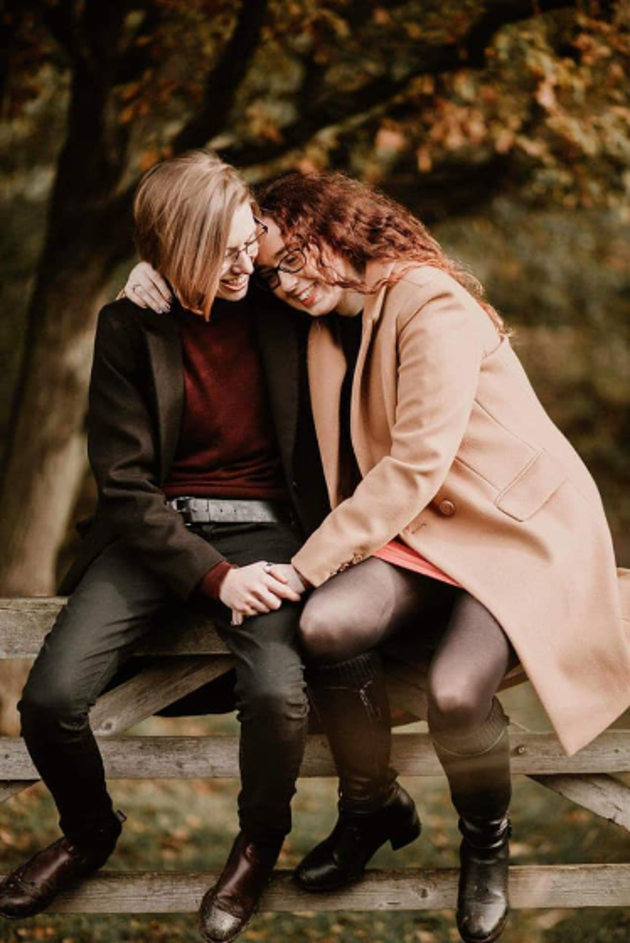
"I would like to plan my wedding without a small part of me being fearful every time we have to explain to a venue, a hairdresser, a DJ, a stationery company that we are two women"
By Jennifer, HR Advisor, ERC at GSK
Getting married is meant to be one of the happiest and most treasured times of anyone’s life, but it comes with stress for everyone, whether you go big or small. I fully anticipated that stress and was truly excited about embracing it, when my fiancée proposed to me in 2018. Being the organised one, I threw myself into the planning - that’s when I realised a lot of things were going to be different for us.
It all started with well-meaning friends, family, and even strangers– “Are you both wearing a dress?”, “Who’s the groom?”, “How will it work when walking down the aisle?”. All these little questions, which at face value are just people taking an interest, started to creep into every conversation about our wedding. At first, it didn’t bother me, why would it? Everyone’s excited and cares about our wedding, and that’s a lovely thing, especially when, as a same-sex couple, we could have received a negative reception from the people around us. However, we started noticing other little things that, when put together, add up to one big problem: we may have equal rights for marriage by law, but by societal unwritten standards, we don’t.
Many people may read this and think “you have the legal rights, what more can you ask for?”. Well, let me tell you! I would like to plan my wedding without a small part of me being fearful every time we have to explain to a venue, a hairdresser, a DJ, a stationery company that we are two women, and being mentally prepared for the fight that would follow any resistance, judgement or issue with that. I would like to plan my wedding without having to cross out “Groom” on every form and change it to “Bride” and correct assumptions that my fiancée, who incidentally has a gender-neutral name, is male with every e-mail or appointment. I would like to plan my wedding without being made to feel like vendors only want us because we will be good for their image – they use “LGBT+ friendly” as a selling point, but why is it even in question as to whether they will cater for us or not?
In 2014, we were granted the right by law to be recognised as a married couple, just like any heterosexual couple, and in those 6 years, the wedding market remains relatively unchanged. Even as the planning led to much-anticipated activities like wedding shows, the progress left to be made for the LGBT+ community was evident. Every tailor we spoke to only made wedding suits for men (which by the way is not just an issue for gay women – straight women don’t always want the big white dress!). We researched for months where we could get my fiancée a suit that would fit our budget, like many of the male-specific tailors would have, but to no avail – what is out there is limited and expensive. In the end, my slight-in-stature fiancée had to buy an aged 14 boys suit and have it tailored! Other smaller challenges came in the shape of napkins, favours, cake toppers, personalised decorations – the “Mrs and Mrs” ranges were incredibly limited, and we had to compromise on so many things just because we didn’t fit the “Mr and Mrs” mould.

My fiancée, Charlie (left) and I
Getting married is really important to my fiancée and I. Not only is it the opportunity to be “normal” and have the life we deserve, but it’s also the added benefits of life being easier for certain obstacles further down the line – children when one is the non-biological parent, same last names, financial future security. Personally, it was also incredibly important to me because I always dreamed of a wedding and struggled to believe that, once my girlfriend because my fiancée, that it could never be what I always imagined. People have fought long and hard to make it possible and I am forever grateful for that. That fight has now led to us having the ability to get married, but there’s so much more than just the legal rights that matter, to truly make the journey for LGBT+ people getting married a completely equal experience.
Take note:
This is a personal article and is not published on behalf of GSK. GSK is committed to fair, equal employment opportunity and inclusion of all employees regardless of race/ ethnicity/ national origin, gender/gender identity, disability, sexual orientation, religion/ belief, marriage/ civil partnership status, age and/or socioeconomic status.

